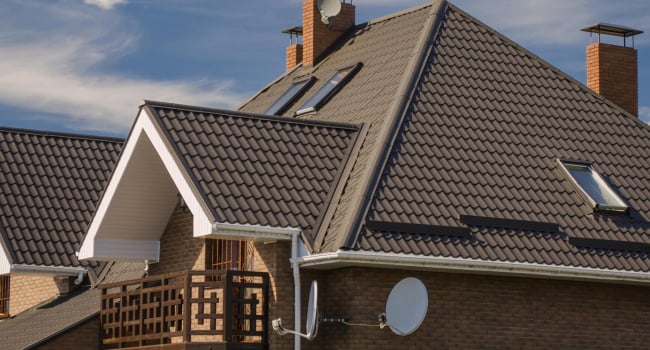
Which roofs are best for houses in sunny cities?
Living in a sunny city has a number of obvious advantages - from extensive solar energy opportunities to good levels of vitamin D in the blood. However, hot weather and an abundance of sunny days a year can turn your home into a real oven if the roof is made of the wrong material.
What materials should you choose for the roof if you live in a sunny city?
Metals
Metal roofs with light, reflective finishes are said to be great for hot climates. They reflect sunlight, minimizing heat absorption and keeping the room cool. Metal roofs are also strong and durable, which is also considered a good selling point. However, they can be noisier during rainstorms and may require additional insulation for better temperature control - all of which are things to consider if you decide to opt for these roofs.
Reflective tiles
Concrete or clay tiles with a special coating reflect sunlight and heat radiation, helping to keep your home cooler. Reflective shingles offer a more traditional aesthetic than metal and can be a good choice for homes in sun-drenched areas that are trying to maintain a consistent architectural style.
Green roofs
These eco-friendly roofs are covered with vegetation - and it not only looks beautiful, but also offers many benefits: plants act as natural insulators, absorbing heat and releasing moisture through transpiration, which has a cooling effect. Green roofs also help control stormwater runoff and improve air quality in urban areas. However, they require a more durable structure and more maintenance compared to traditional options.
What else should you know?
Choosing the right roofing material is just one piece of the puzzle. If you live in a hot, sunny city, there are some other factors to consider:
- Ventilation: Proper ventilation is critical in sunny climates: it allows hot air to escape without allowing it to accumulate under the roof and enter the living space.
- Insulation: Proper roof insulation plays a vital role in regulating indoor temperature. Adequate insulation acts as a barrier to prevent heat transfer from the roof to the living space, keeping your home cool in the summer and warm in the winter.
- Most read
month
week
day
- How will new technologies change future of finance? Interview with director of Apricot Capital (video) 770
- 10 most interesting architectural works of Zaha Hadid 762
- 5 original buildings with curious optical illusions (photos) 752
- Google is developing a budget smartwatch 661
- Alphabet will pay dividends for the first time in its history 659
- 4 flares erupted from Sun in rare event: the Earth may be hit by geomagnetic storm (video) 645
- Large taxpayers of Armenia’s IT sector: What changes have taken place in 2024 Q1? 641
- Date of new Apple presentation known: When will they show us new iPad Pro with OLED screen? 635
- Mutated bacteria resistant to drugs found on the ISS: What does this mean and why is it a problem? 626
- BAR Plus 2024: Samsung introduces USB drive that can withstand immersion in salt water for 72 hours (photo) 622
- Archive
